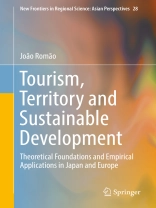Welfare rise, spatial mobility, and global information and communication channels (in particular, social media) have prompted the emergence of a specific booming and rapidly growing mobility industry all over the world, namely tourism. The tourist sector (including recreation and leisure activities) has turned into a complex contemporaneous socio-economic and geographic phenomenon, with a multiplicity of travel motives (e.g., entertainment, culture, relaxed life style, wellness, nature, etc.) and with a wide variety of impacts (e.g., urban- and regional-economic effects, crowding phenomena, environmental decay, etc.).
Time has now come to offer a synthesis of the analytical apparatus in tourism research, with particular attention for system-wide, socio-economic and environmental dimensions of this important global industry. Tourism has in the past been a largely neglected field in regional science research. And therefore, it is laudable that João Romão has taken the decision to compose a systematically designed and well crafted monograph on the socio-economic, environmental and spatial dimensions of modern tourism. It offers a wealth of analytical insights and quantitative research tools for advanced tourism studies. It also fills an important gap in the current regional science literature.
Peter Nijkamp, Tinbergen Institute, Amsterdam
表中的内容
Preface.- 1. Introduction.- 2. Tourism economic impacts.- 3. Tourism, a place-based activity.- 4. Tourism, a knowledge-based activity.- 5. Tourism dynamics and regional sustainable development.- 6. Spatial-economic impacts of tourism on regional development: contemporary challenges.
关于作者
Dr. João Romão is a Lecturer in Tourism and Regional Economics at Hokkaido University (Japan) and a Researcher at University of Algarve (Portugal), where he obtained his Ph D. in Tourism. He also holds a Ms C. in Economics and Management of Science of Technology (University of Lisbon, Portugal) and he had international research experiences on environmental studies (Yale University, USA) and spatial economics (VU-Amsterdam, the Netherlands). His research interests and consultancy experience also include aspects related to innovation systems and urban planning. He is a co-chair of the Cluster on Tourism, Leisure and Recreation of the Network on European Communications and Transport Activities Research and a founding member of The Regional Science Academy.












